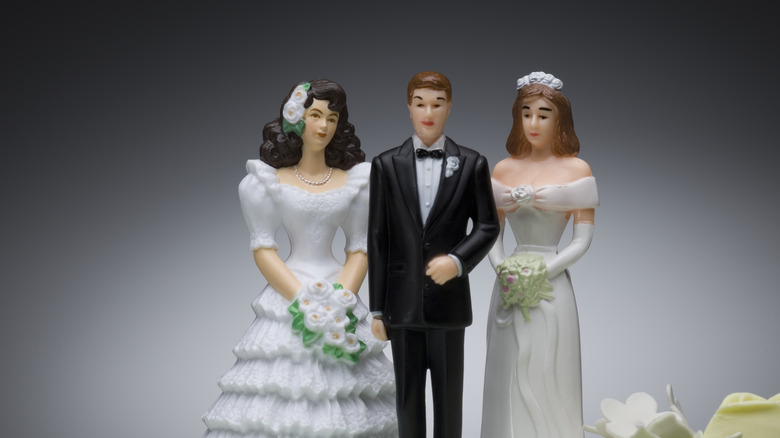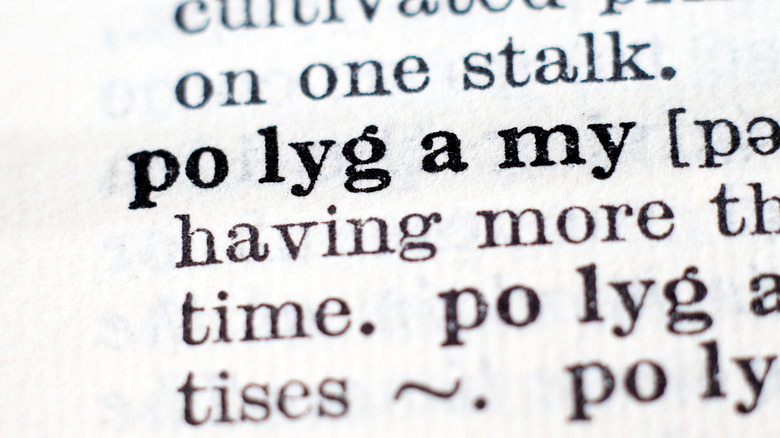What Does The Bible Actually Say About Polygamy?
The Bible devotes much of its narrative to passages about marriage and the love between husbands and wives. As Easy English Bible notes, a whole book in the Old Testament — Song of Songs, which has been traditionally attributed to King Solomon — is effectively one long poem about love and sexual longing between a man and a woman. And some of it is downright saucy, describing the woman's body parts in exacting, if metaphorical, detail. Similarly, over in the New Testament, the writer of Galatians tells husbands to love their wives, even to the point of death, comparing a husband's love for his wife to Jesus' sacrifice of his own life for mankind.
But oftentimes when the Bible mentions marriage, it's mentioned within the context of polygamy. For example, many of the men mentioned in the Old Testament had multiple wives: Jacob had four, David had eight, and King Solomon had hundreds. Meanwhile, over in the New Testament, the marriage relationships mentioned seem to refer to one man and one woman (such as Jesus' parents, Joseph and Mary), although polygamy certainly went on in that culture at that time, according to Chabad.
These days, most Christians and Jews, with very few exceptions, eschew polygamy — in spite of what the Bible says about it.
The Bible treats polygamy neutrally, with one very specific exception
When the Old Testament mentions polygamy, it's mentioned neutrally: the practice is neither promoted nor condemned. Indeed, sometimes men who took on extra wives did so to their peril, but because of other problems as opposed to the marriage itself. Solomon, for example, had hundreds of wives but didn't get into any real trouble until he disobeyed God and took on foreign wives, who then convinced him to worship idols, per Prado Museum. In other words, it wasn't the fact that he had multiple wives that was the problem — it was that some of them were the wrong wives.
The one exception to this neutral approach to polygamy comes in the New Testament. Over in 1 Timothy, the Apostle Paul instructs readers on appointing leadership positions in the church and declares that any candidate for a certain job must be "faithful to his wife," according to some English translations. According to the King James Version, the translation is roughly "the husband of but one wife." Writing in Christianity.com, Heather Riggleman noted that the King James translation is closer to the original Greek. Putting aside the nuances of translation issues, the original text effectively calls for any candidate for such a leadership position to be a "one-woman man."
Why most Jews and Christians eschew polygamy
If the Bible treats polygamy neutrally, with the exception of one very specific case, then why do the overwhelming majority of the world's Christians and Jews eschew the practice?
Writing in Chabad, Naftali Silberberg notes that while the Old Testament does not outlaw polygamy, nearly all of the polygamous marriages in the text were entered into for a specific reason. "As far as Jewish thought is concerned ... polygamy is not, and never was, an ideal state. The [Old Testament is] replete with references to husband and wife being two halves of one whole," he writes. Indeed, in A.D. 1000, Rabbi Gershom banned polygamy for all Ashkenazic Jews, with other Jewish communities outlawing polygamy later.
Christendom has, by and large, taken on the same view. In the 1500s, the Council of Trent outlawed polygamy for all Catholics, according to Papal Encyclicals Online. And when the Protestant Reformation came along, church leaders wrestled with the issue but ultimately moved toward fully banning plural marriage, as Susan Mobley writes for Concordia University, Nebraska. She points to the same general principle that Gershom did: Though the Scriptures don't forbid polygamy directly, the broader ideal is that a marriage is a relationship between two people, and two people only.
When the Old Testament was written, polygamy was sometimes practical
Another thing to consider about the Bible's teachings about polygamy was that times were different. According to The Christian Post, women were largely dependent on men, whether it be their relatives or their husbands. If there was no man to support them, they had little recourse other than to become slaves or prostitutes. So while not ideal, joining or forming a polygamous family was sometimes done as a matter of protection.
Polygamy was also a matter of practicality for some men. It ensured their lineage was kept intact if his first wife could not bear him children. Marriage was also a way to form alliances between nations, which was reportedly the situation for Solomon and King David.
Yet even though the Bible permitted polygamy, it was still generally avoided if possible. As The Christian Post reported, the Bible claims plural marriage always leads to problems. It also defined marriage as the union between one woman one man — not several people. But the Bible says God is willing to let polygamy slide because he understands the human condition and the demands of its societies.



